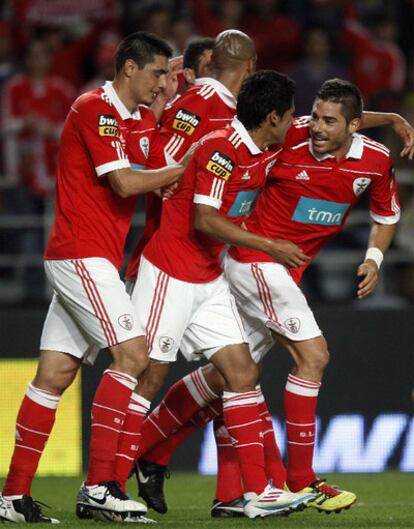Portugal's triple-pronged renaissance
Iberian nation boasts three Europa League semifinalists for first time in history
In spite of Portugal's well-documented financial straits, it's soccer teams are riding the swell of a renaissance in Europe. Porto, Benfica and Braga, three of the four Europa League semifinalists, are leading the charge this season, the first in history with a triumvirate of Portuguese teams in the last four of the continent's second competition. The country's last winner of what was then the Uefa Cup was Porto under José Mourinho in 2003.
"Soccer is like the waves and, this time, we have caught the biggest one. Economic conditions [in Portugal] make it more difficult for us. That's why what we are seeing is so romantic," says Jesualdo Ferreira, a former coach of Málaga who has also managed each of the three semifinalists over the last decade.
"The fifth-placed side in England, Italy or Spain will never be a match for Porto, Benfica or Braga"
Benfica and Porto, two of the Primeira Liga's traditional big guns, have budgets of around 40 million euros, similar to that of La Liga's recently sold Getafe. Braga, meanwhile, operates on around 17 million eurosand none of its first-team players receive more than 20,000 euros a month. "Braga is a team that was born of its roots, like Villarreal [the fourth semifinalist, which travels to Porto for the first leg tonight]. When I arrived in 2003, the side was in relegation trouble. We stayed up and the team has grown year by year up to the point of challenging Benfica for the title and getting into Europe," says Ferreira.
There has been no Portuguese finalist in the Uefa Cup / Europa League since 2005, when Sporting lost to CSKA. Not since 1991, when the same side lost to Inter, has any other Primeira Liga team featured in a semifinal. Only Villarreal can prevent an all-Portugal final unfolding in Dublin on May 18.
What some sections of the Portuguese media describe as "an adventure," Ferreira terms a miracle: "It's strange, because what has happened this year does not represent the reality of Portuguese soccer. The infrastructure does not complement the quality of the coaches and players [...] it's an old political problem."
"Benfica, Porto, Sporting and Braga are the big sides but when we play against half the bottom of the table the pitches are equivalent to Segunda B in Spain," notes Fran Escribá, assistant to Quique Sánchez Flores at Atlético Madrid and during the 2008-09 season at Benfica. The reason for Portugal's resurgence, says António Magalhães, deputy director of sports daily Record, is the "Mourinho effect."
"Since his Uefa Cup and Champions League wins with Porto, Portuguese players changed their mentality, as if they had adopted the slogan 'Yes, we can.' It also helped that the national team reached the final of Euro 2004. That started to breed more self-esteem, and the belief that they could compete with Europe's biggest teams, and win."
Antonio Tadeia, deputy director of O Jogo, says the format of the Europa League also helps: "Porto, at best, could reach the quarterfinals of the Champions League. With the new format [teams eliminated from the Champions League group stage in third place drop into the Europa League round of 32], the richer, stronger teams get richer and stronger and the rest have to make their way in the Europa League, a competition for middle-class sides, like Portuguese clubs. The fifth-placed side in England, Italy or Spain will always be inferior to Porto, Benfica or Braga."
Benfica plays Braga in the other semifinal while Porto, already crowned Portuguese league champion, will pit the wits of the latest coach de jour, André Villas Boas, assistant to Mourinho at the Primeira Liga club, Chelsea and Inter, against Villarreal. There are few Portuguese players in any of the starting line-ups - two at Benfica, three at Porto and five at Braga.
"They have plenty of talent," says Escribá. "One thing about Portuguese soccer that has always attracted my attention, beyond the fact that even the referees appear in the gossip press, is the talent all the players have. But also how disastrous they are at the tactical level. I have always thought that Portuguese players lack a little professionalism to reach the level of a Spanish or Italian player. Rui Costa, Figo, Simão, Nani, Cristiano Ronaldo... they all had to go abroad to learn."

Tu suscripción se está usando en otro dispositivo
¿Quieres añadir otro usuario a tu suscripción?
Si continúas leyendo en este dispositivo, no se podrá leer en el otro.
FlechaTu suscripción se está usando en otro dispositivo y solo puedes acceder a EL PAÍS desde un dispositivo a la vez.
Si quieres compartir tu cuenta, cambia tu suscripción a la modalidad Premium, así podrás añadir otro usuario. Cada uno accederá con su propia cuenta de email, lo que os permitirá personalizar vuestra experiencia en EL PAÍS.
¿Tienes una suscripción de empresa? Accede aquí para contratar más cuentas.
En el caso de no saber quién está usando tu cuenta, te recomendamos cambiar tu contraseña aquí.
Si decides continuar compartiendo tu cuenta, este mensaje se mostrará en tu dispositivo y en el de la otra persona que está usando tu cuenta de forma indefinida, afectando a tu experiencia de lectura. Puedes consultar aquí los términos y condiciones de la suscripción digital.








































